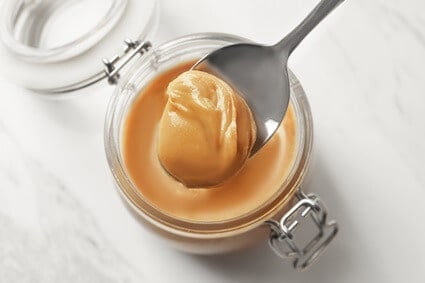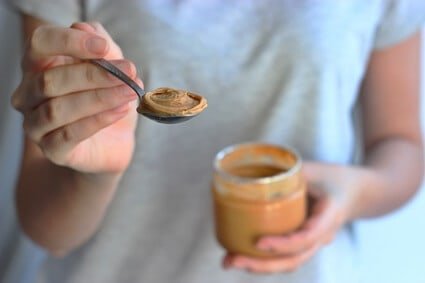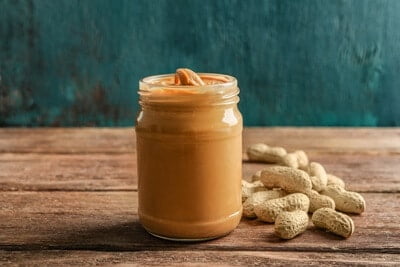Peanut butter is flavorful, high in protein, and a good source of energy. If you’re looking for a special treat to share with your cat, peanut butter may seem ideal. Cats need lots of protein in their diet, and peanut butter can be mixed with several kinds of food. However, the truth is that peanut butter can be harmful to cats.
Peanut butter isn’t toxic to cats. Your cat can enjoy it as an occasional treat, provided that the portion size is kept small. However, if peanut butter is consumed long-term or to excess, your cat may become ill. Peanut butter is a plant-based food, so your carnivorous cat will be unable to digest it properly. It’s also empty calories, high in salt, and contains preservatives and added sugar. It can also be a choking hazard due to the texture.
Some brands of peanut butter also add xylitol, which might be toxic to cats. Peanut butter cookies and ice cream introduce even more sugars, empty calories, and dangerous ingredients. Most cats dislike the taste of peanut butter, but your cat may still be curious about what it’s missing out on. If your cat likes peanut butter as a treat, you should ration it carefully. Otherwise, there’s a risk of obesity, upset stomach, and even heart or liver problems.
Is Peanut Butter Toxic To Cats?
The peanuts themselves are not harmful, and added ingredients like salt and oil are not dangerous either. You can feed your cat a small helping of peanut butter, and it will not get sick. However, just because your cat won’t be immediately ill doesn’t mean peanut butter is without risks.
As mentioned, peanut butter is a plant-based product. Felines are carnivorous, so their body is not designed to eat plants or function on them. In small quantities, plants will not harm them, and cats are known to sample vegetables if they taste right. However, eating plant-based food in large quantities or over time can be detrimental.
At the least, your cat will be consuming empty calories when it samples peanut butter. The flavor may be enticing, but all the health benefits of this food are lost. A cat’s digestive system isn’t built to extract those nutrients, vitamins, or minerals. As such, all those healthy properties will pass through your cat’s body, unused.
Do Cats Like Peanut Butter?
Most cats do not like peanut butter. If you offer a spoonful to a curious feline, it’s likely to smell it and then turn it down. That’s because cats know they’re meat-eaters, so plants or plant-based foods hold no appeal to them.
Likewise, peanut butter can be sticky and hard to swallow. Cats that eat it are often put off by the need to chew, lick, and stretch their jaw to swallow it. While dogs often accept this as the necessary price for a good treat, cats usually prefer to avoid the ordeal.
With that said, every cat is different. Some will taste the peanut butter if they’re especially hungry or just curious. Most will decide the flavor isn’t to their liking after this, but others may develop a craving for it.
Don’t take this as a sign that your cat knows best and can readily eat all the peanut butter it wants. In the same way that certain felines will eat string, buttons, or other non-edible food, your cat may be enticed by the flavor.

Can Cats Eat Peanut Butter As A Treat?
If your cat is interested in eating peanut butter, you can offer it as a treat. As long as it’s in small quantities, given sparingly, and doesn’t ruin the cat’s appetite, it’s safe. Just be sure that it doesn’t become a daily treat or weekly treat. If your cat begs for more, don’t give it a larger portion or second helping.
What Happens If Cats Eat Peanut Butter?
When a cat eats a small helping of peanut butter, nothing exceptional happens. The cat will lick it up or work its jaw awkwardly to swallow down a larger clump. After this, its body will start to digest the peanut butter.
It won’t be entirely successful since peanut butter is plant-based, but it will take what nutrients it can. It will also store sugars, process the calories, and pass the rest of the peanut butter as a mostly useless food.
This seems harmless, and it is. However, that changes the more your cat eats peanut butter. Here are some issues you can expect to run into long-term:
Not Enough Nutrients
Cats are obligate carnivores. As such, they cannot absorb or fully digest the proteins that are found in peanut butter. Even if they could, the vitamins and minerals in peanut butter are not something that their bodies need.
As such, cats eat it for flavor, not for health. If they’re given large quantities of peanut butter, their inability to digest it may even lead to stomach upset.
High In Calories
Peanut butter is calorically dense. Calories, by themselves, are not a bad thing. However, since peanut butter doesn’t contain the right nutrients, your cat will get full on what’s essentially useless food.
The cat may stop eating as a result, which can lead to protein and vitamin deficiencies. On the flip side, your cat may still eat its regular food as a way to compensate for the lack of nutrients. When it does this, it’s over-eating, which can lead to illnesses. From obesity to diabetes to general lethargy, it can cause lasting damage to your cat’s body.
Choking Hazard
Peanut butter is sticky and dense, making it hard to swallow. If your cat laps up too much, that may get spread throughout its mouth and then obstruct its airway. Even once swallowed, if the portion is too large, it may still get caught in your feline’s throat and result in choking.
You can ration out the amount of peanut butter and make sure your cat only licks at the food instead of wolfing it down. However, there’s still a danger. It’s hard to get peanut butter out of your cat’s mouth if it gets too eager. Smaller cats, especially kittens, can choke on even the smallest portions.
To avoid choking hazards, be sure to monitor how much your cat eats. Always have a source of fresh water available to help the feline wash down the food.
Added Sugars
Peanut butter isn’t ideal for cats because of how it’s manufactured. Commercially-bought peanut butter often contains added sugars and flavorings. These enhance the taste for people but can harm your cat.
A cat’s body isn’t designed to process synthetic sugar. Even natural sugars are rare in a carnivorous diet. That can lead to your cat gaining weight or experiencing health issues due to too much peanut butter.
Contains Preservatives
Peanut butter often contains preservatives as a way to improve the shelf life of each unit. This can be harmful to your cat’s body. A prime example is found with trans fatty acids. These exist in peanut butter as a byproduct of margarine and manufactured cooking oils.
Even hydrogenated vegetable oils alone have been known to increase the risk for heart disease. Trans fatty acids increase this risk while also raising the chances of your cat developing certain types of cancer.
The good news is, you can easily avoid these ingredients by buying organic peanut butter or making your own. All it takes is peanuts, oil, and a blender. While it won’t keep forever, it’s certainly healthier for your cat.
High In Salt
Aside from oil, the main ingredient found in peanut butter is added salt. Depending on the brand, peanut butter may be exceptionally high in sodium or rather low. However, it’s never entirely 0%.
Salt, by itself, is not a harmful substance. In fact, many high-quality vet-recommended cat food brands contain sodium. Like most animals, cats need a certain amount of sodium to stay healthy and absorb nutrients better.
However, commercially available cat food has a carefully regulated amount of salt, according to the Journal of Animal Physiology and Animal Nutrition. This keeps it at a safe level so your cat doesn’t get overwhelmed by sodium.
If your cat eats salt in its normal food, then gets extra salt from peanut butter, it may get salt poisoning over time. This can be a life-threatening condition. Salt poisoning can result in:
- Tremors and seizures
- Damage to the kidneys
- Even death
Is Peanut Butter Bad For Cats?
Peanut butter doesn’t hurt cats, but it’s not good for them either. The extra sugar, calories, and lack of nutrients make it an acceptable treat but not a healthy food for cats. Worse yet, there are times where peanut butter is actively harmful, depending on the:
- Brand you choose
- Ingredients it contains
- Health status of your cat
Xylitol
Perhaps the most concerning ingredient found in peanut butter can be xylitol. Xylitol is an alternative to sugar and is commonly found in sugar-free food. It tastes and looks similar to sugar, but it doesn’t raise blood sugar levels. It’s also lower in calories.
This can make it seem like a great alternative if you’re trying to avoid the danger of sugar in traditional peanut butter. However, xylitol is widely known to be fatal to dogs, even in small amounts. According to the Journal of Veterinary Pharmacology and Therapeutics, its effect on cats is still up for debate, but some signs point to it being dangerous.
Researchers in the study determined that cats did have a significant increase of glucose in their blood, a common reaction to xylitol in dogs. While these glucose levels stayed within a safe range, the test did not continue long-term. Likewise, the study only used a small sample of 6 cats.
Because of this, it’s wise for owners to avoid xylitol. Until more research can confirm that it’s safe, you could be risking your cat’s health for a treat that’s easily replaced by healthier food.
Your cat may have no issues eating xylitol foods. It may also get away with this in the short-term only. It may even have an adverse reaction out of nowhere, requiring medical intervention. Sugar isn’t good for cats, but sugar-free substitutes are far riskier.
Aflatoxins
Many veterinarians warn pet owners against feeding their cats peanuts due to aflatoxins. Aflatoxins are a type of toxin that is often found in many crops, like maize and rice. However, it’s also found in nuts, especially peanuts.
Aflatoxins are dangerous because they are a known carcinogen that can cause liver damage. They infect different crops through the species of mold that produces them. It’s easy for this mold to thrive within the shells of peanuts, undetected. According to Food Chemistry, this is a common problem that both farmers and government legislation are working to limit and prevent.
Most peanuts contain aflatoxins. However, those purchased from the store have been regulated and reviewed to ensure that they only contain minimal amounts. The levels found in these peanuts are completely safe for you to eat. However, the same can’t be said for cats.
No tests have been done to determine the safe amount of aflatoxins for felines. Cats are also much smaller than people, so it takes a much smaller amount of this toxin to harm them.
Allergies
Just like humans, cats can have peanut allergies. They can also suffer from life-threatening reactions. The most common clinical signs of an allergic reaction include.
- Itching
- Hair loss
- Vomiting
- Diarrhea
- Loss of appetite
- Losing weight
If your cat has a strong allergy, it may even have trouble breathing. This can lead to suffocation and eventual death.
Unfortunately, there is little way for you to know if your cat has a peanut allergy until it tries peanuts. If you offer this snack, be sure to watch out for symptoms. If the slightest reaction surfaces, it’s best to consult a vet and avoid peanut butter altogether.

Can Cats Eat Peanut Butter And Jelly Sandwich?
In small amounts, cats can eat peanut butter and bread safely. Both are empty calories to felines, but neither of them is toxic or immediately harmful. The main danger will lie in the jelly.
Cats can safely eat most types of jelly. Grape jelly, however, is toxic. That’s because grapes and their byproducts (like wine, grape juice, and raisins) contain tannins. These are harmful to many pets and can lead to symptoms like:
- Vomiting
- Increased heart rate
- Anxiety
- Painting
- Abdominal pain
- In extreme circumstances, seizures
As such, you should avoid grape jelly in your peanut butter sandwiches at all costs. Other types of jelly will not be harmful, but keep in mind that they’re high in sugar. Most are plant-based as well, so they’re fattening, lack nutrients, and can’t be fully digested by your cat.
If your cat is begging for a corner of your peanut butter and jelly sandwich, feel free to give it a taste. Just don’t make it a full meal or a regular treat.
Can Cats Eat Organic Peanut Butter?
Organic peanut butter may lack the preservatives that commercial peanut butter has. This is good news, but all types of peanut butter will contain:
- Salt
- Oil
- Peanuts
These can individually cause issues for your cat. Feeding your cat organic peanut butter will limit the trans fatty acids it has to deal with. It will also ensure there is no xylitol. However, it won’t stop it from being fattening, with empty calories and few nutrients. Your cat shouldn’t eat any peanut butter in large quantities or over the long term.
Can Cats Eat Peanut Butter Ice Cream?
Peanut butter ice cream is bad for your cat. This isn’t because it contains peanuts; it is because it’s ice cream. All ice cream is bad for cats. Commercial brands contain preservatives, added sugar, and extra salt. Even with organic or homemade ice cream, there’s no way to avoid the fact that it’s a dairy product.
Most adult cats are lactose-intolerant. Their bodies cannot process dairy, so it leads to stomach upset in the short term, dehydration, or severe illness in the long term. Even if your cat readily laps up cow’s milk or begs for a spoon-full of ice cream, it is likely to get sick afterward.
Any milk aimed at cats is lactose-free and commonly made from dairy substitutes, like goat’s milk. Kittens are known to drink milk because of an enzyme that develops in their stomach. It allows them to consume their mother’s milk safely, but this fades as they age. As such, peanut-flavored or no, cats should not eat ice cream.
Can Cats Eat Peanut Butter Cookies?
Cookies are not safe for your cat. Whether they have peanut butter flavoring or not, they still contain ingredients that are harmful to cats. Your pet may not get immediately sick after snacking on a crumb, but it can experience digestive issues from eating a whole cookie.
That’s because these treats contain high amounts of butter, salt, and sugar. Ingredients like vanilla and chocolate are also toxic for cats, even in small amounts. Peanut butter itself isn’t an ideal treat for cats. Putting it in cookie form only makes this worse.
Peanut butter is OK to give to cats, as long as you ration it and pick the right kinds. It’s not good for them, nor is it helpful to their diet in any way. However, cats won’t get sick from tasting a bit of peanut butter as long as it contains as little salt, preservatives, and sugar as possible.

